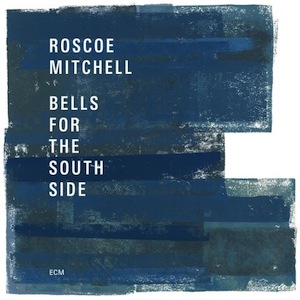Label/Year: ECM, 2017
Lineup: Roscoe Mitchell: saxophones, flute, percussion; James Fei: saxophones, clarinet, electronics; Hugh Ragin: trumpet; Tyshawn Sorey: trombone, piano, drums, percussion; Craig Taborn: piano, organ, electronics; Jaribu Shahid: bass, percussion; Tani Tabbal: drums, percussion; Kikanju Baku: drums, percussion; William Winant: percussion, glockenspiel, vibraphone, marimba, woodblocks, timpani
Prolific avant-garde saxophonist Roscoe Mitchell was one of the mighty members and co-founder of the open-minded collective Art Ensemble of Chicago, a group that definitely changed the way of seeing and approaching jazz.
His recent double-disc album, Bells For the South Side, is his fourth for the ECM label and embraces all the slashing experimentalism that has been characterizing his music making for more than half a century.
Every single musician from this lineup had recorded with Mitchell before, namely, pianist Craig Taborn, bassist Jaribu Shahid, trumpeter Hugh Ragin, multi-reedist James Fei, and drummers/percussionists Kikanju Baku, Tani Tabbal, William Winant, and Tyshawn Sorey.
Disc one, comprising six tracks, opens with “Spatial Aspects Of The Sound”, an abstract piece designed for the amorphousness of Taborn’s piano, which intercalates with percussive bell chimes and occasional gunshot-like sounds. Mitchell’s flute suddenly appears in the last minutes. The same orientation is followed on “EP 78492", a percussive dive into the abstract, and also on the title track, which sounds like an anthem and brings all the above plus Ragin’s trumpet dissertations.
Arranged solely for reeds, “Prelude to a Rose” counterpoints swaggering melodic lines in order to sketch curvy and angular configurations alike. The precise blows come from Mitchell, Sorey, and Ragins on alto saxophone, trombone, and trumpet, respectively.
One of the most enticing compositions of this first set is “Panoply”, whose title corroborates the overflow of percussive rattles, authoritative and expansive horn purges, and on/off kinetic drumming. To neutralize the occasional silences, there are a couple of feral improvisations with prominence for Winant on marimba. “Dancing In The Canyon” is another worthy trip piqued by Taborn’s effective pianism and electronic elements, Baku’s jittery rhythms, and the bandleader’s outlandish cries. After a while, the sounds are tunneled to form a bigger mass, intensifying the consistency and coordinating other smaller explosions with rhythmic sense.
Disc Two introduces the 16-minute “Prelude to the Card Game, Cards” with saxophone and bowed bass followed by Tabbai’s long drums monologue. The tune resumes the sax/bass reciprocity for the ending.
On “The Last Chord” there’s also plenty interactive work with the horn section responding to ferocious piano sweeps and energetic percussion discussions.
Eerie vibes take hold of “Six Gongs and Two Woodblocks” and are extended to the beginning of the 25-minute closing tune “Red Moon in the Sky, Odwalla”. Things get intensely wild in the middle, but find repose when stepping on a groovy blues with a swing/Latin feel adorned by fantastic improvisations.
Roscoe Mitchell continues to blur the line between composition and improvisation, targeting adventurous listeners with non-stereotyped languages. For the ones who are not familiar with his music, this can be quite difficult.
Grade B+
Favorite Tracks:
02 (disc1) – Panoply ► 04 (disc1) – Dancing in the Canyon ► 02 (disc2) – The Last Chord


